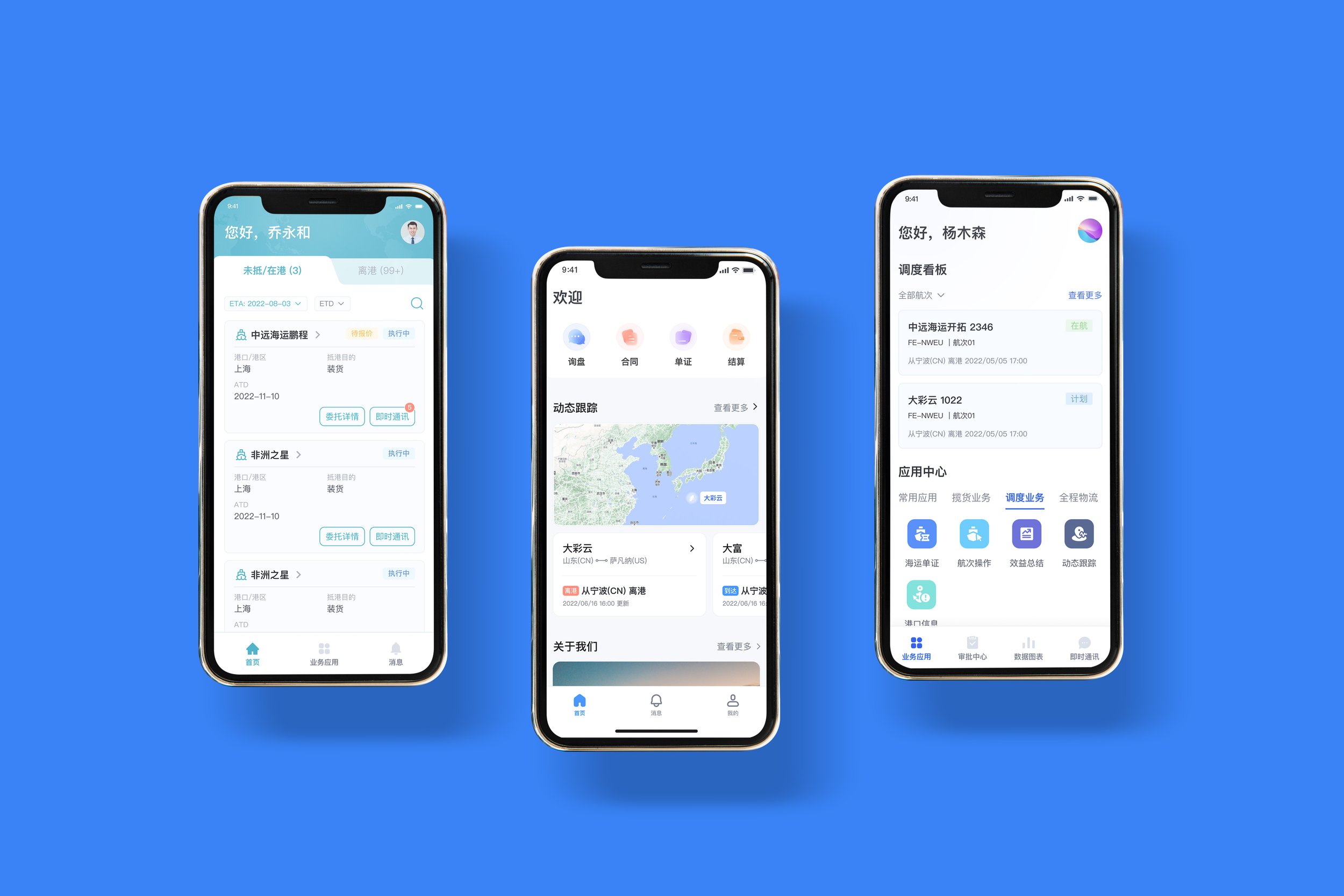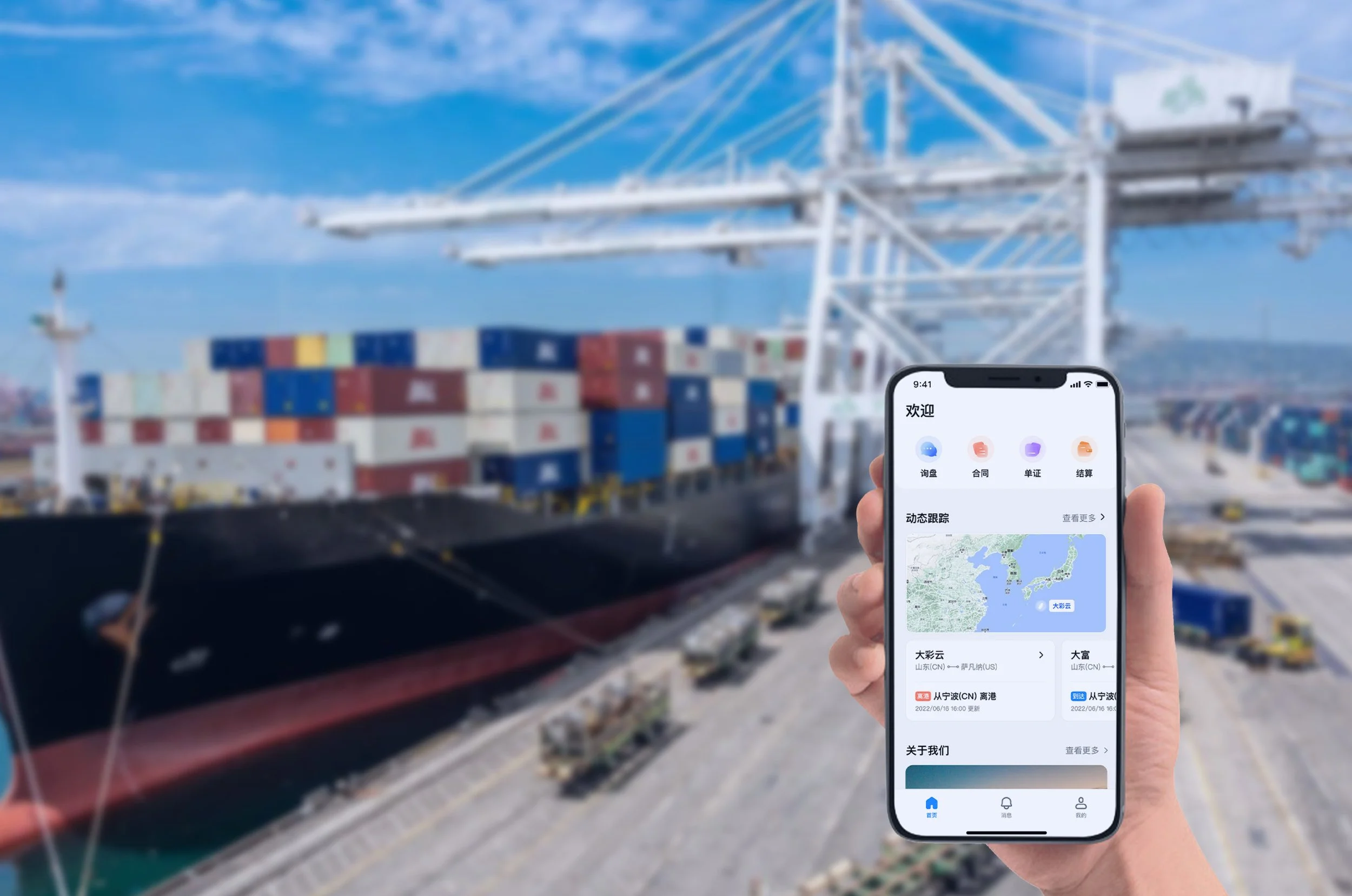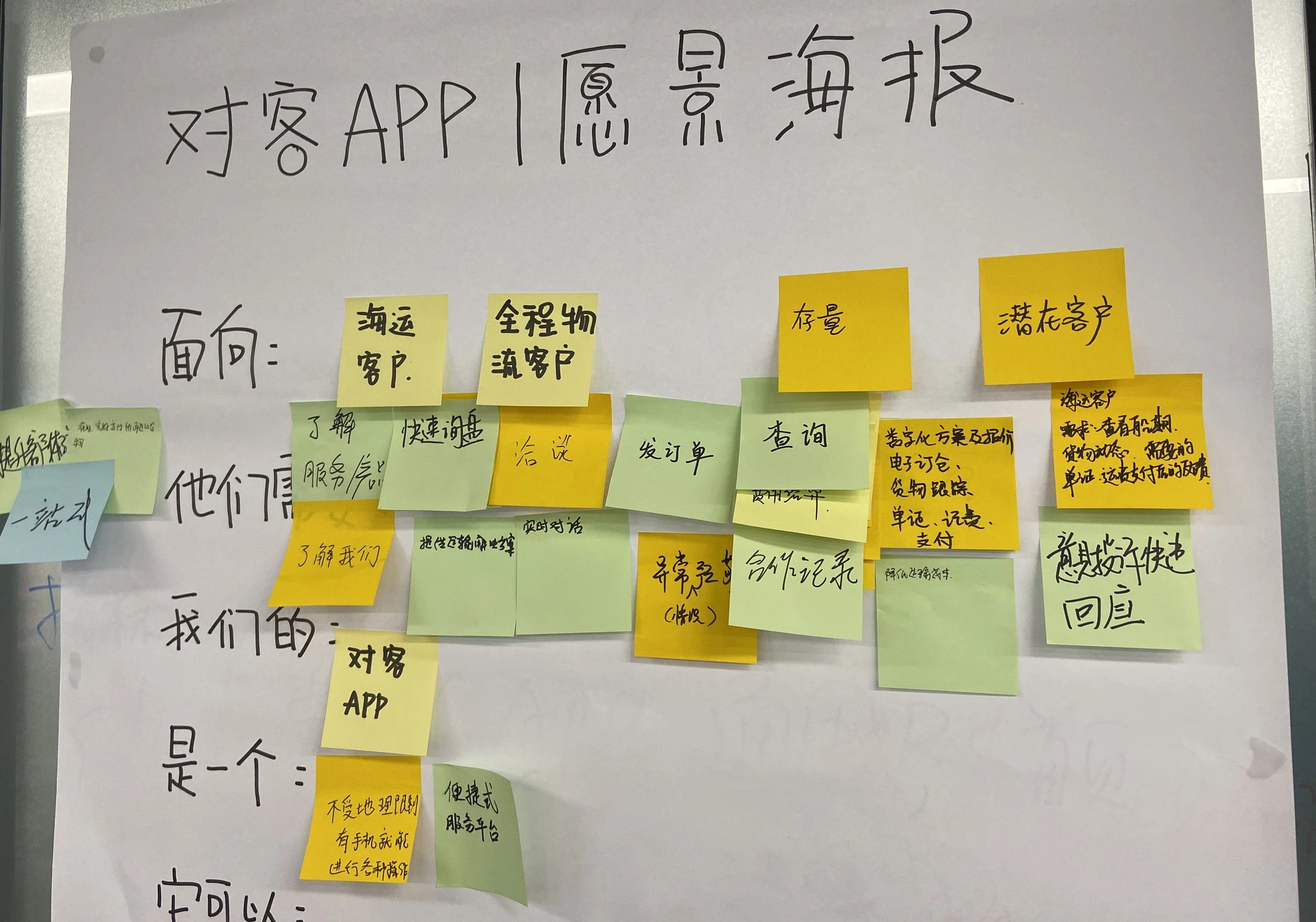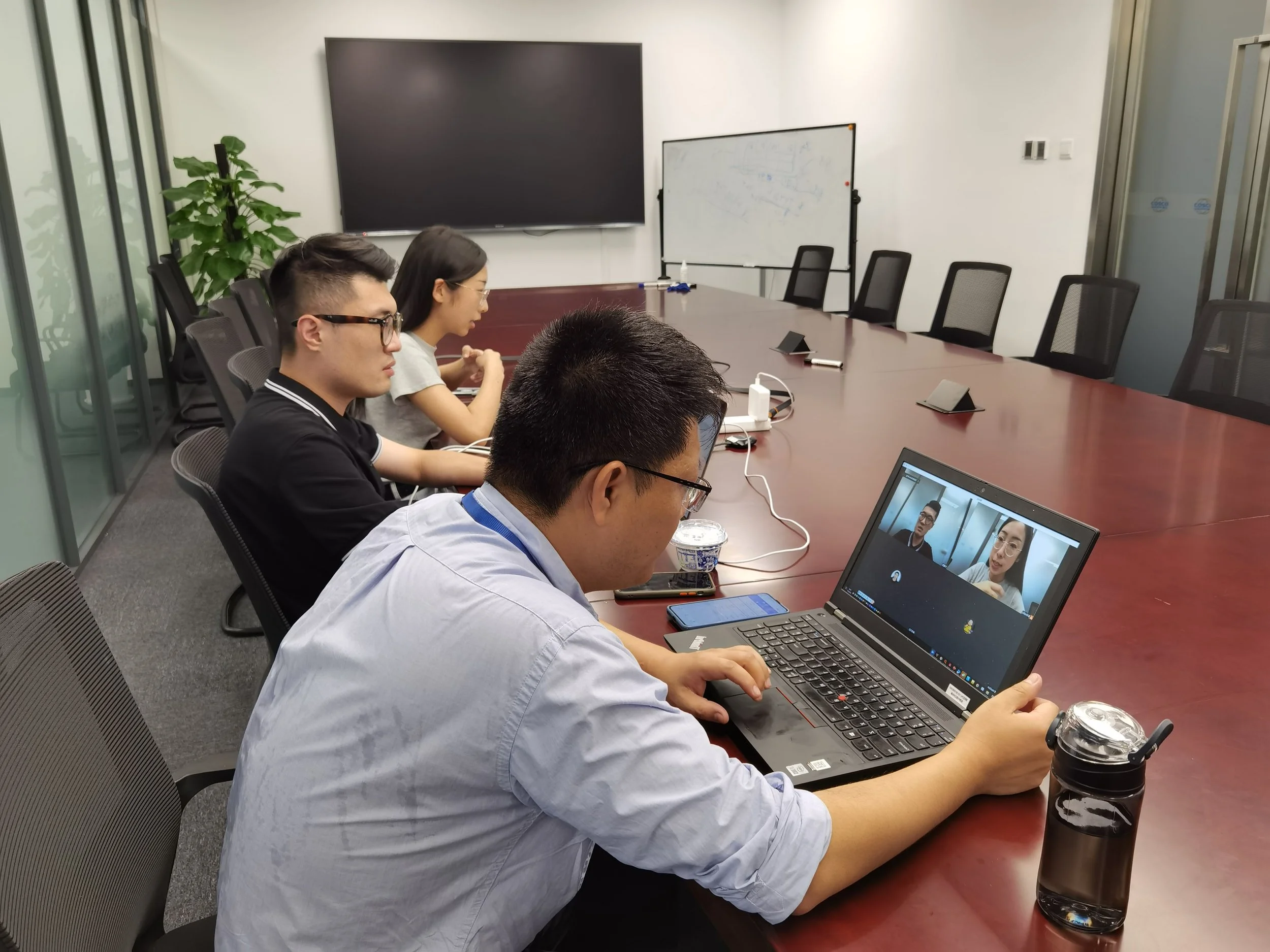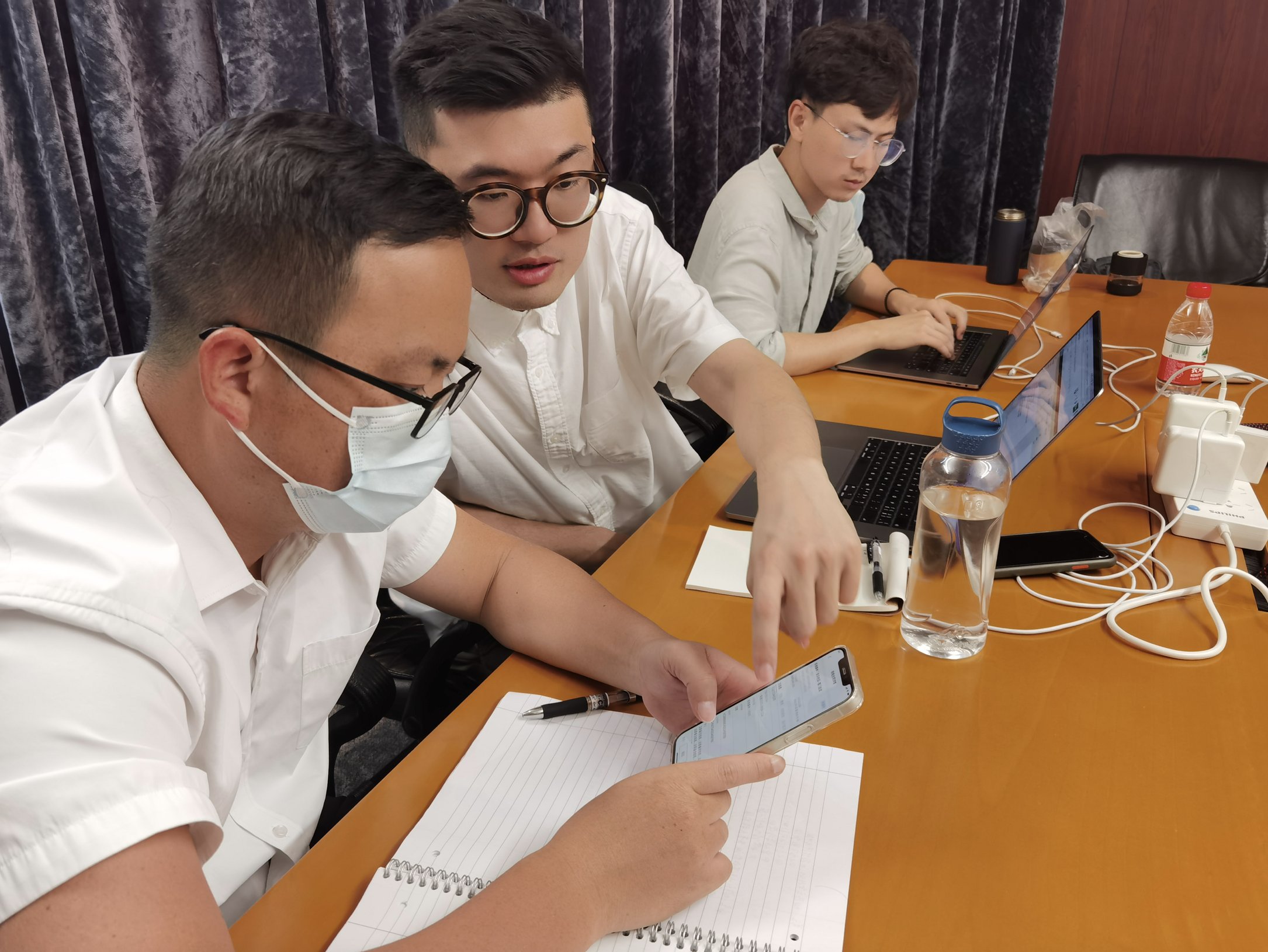COSCO SPEC 3 APPs
COSCO SPEC 3 APPs
JUN 2022 - SEP 2022
Platform
APP
Service
Design Consulting
Domain
Sea Freight
Location
China (Guangzhou)
The client is dedicated to the operations and management of more than 100 vessels. The scale of this specialized shipping fleet ranks it as the largest in the world.
They are looking for a partner to design 3 brand-new APPs, for their clients, suppliers, and employee based on their 3 corresponding systems on PC, which is designed by their business team and was not been launched yet.
To comply with my non-disclosure agreement, I have omitted and obfuscated confidential information in this case study. All information in this case study is my own and does not necessarily reflect the views of the client.
Scope and mission
Explore the out-of-office scenarios which have not been well-covered by the system on PC and include them in the APP.
Verify if the design of the PC version is rational while designing the corresponding APP.
Encourage their employee, clients, and suppliers to migrate their work from the offline process to the system and engage more potential users to use the product.
Challenge
-

Multi-vendor environment
Our team only takes charge of UX and interaction design in this project, the rest are handled by a UI agency and developer team. Each of us has a different mission and sometimes it conflicts.
-
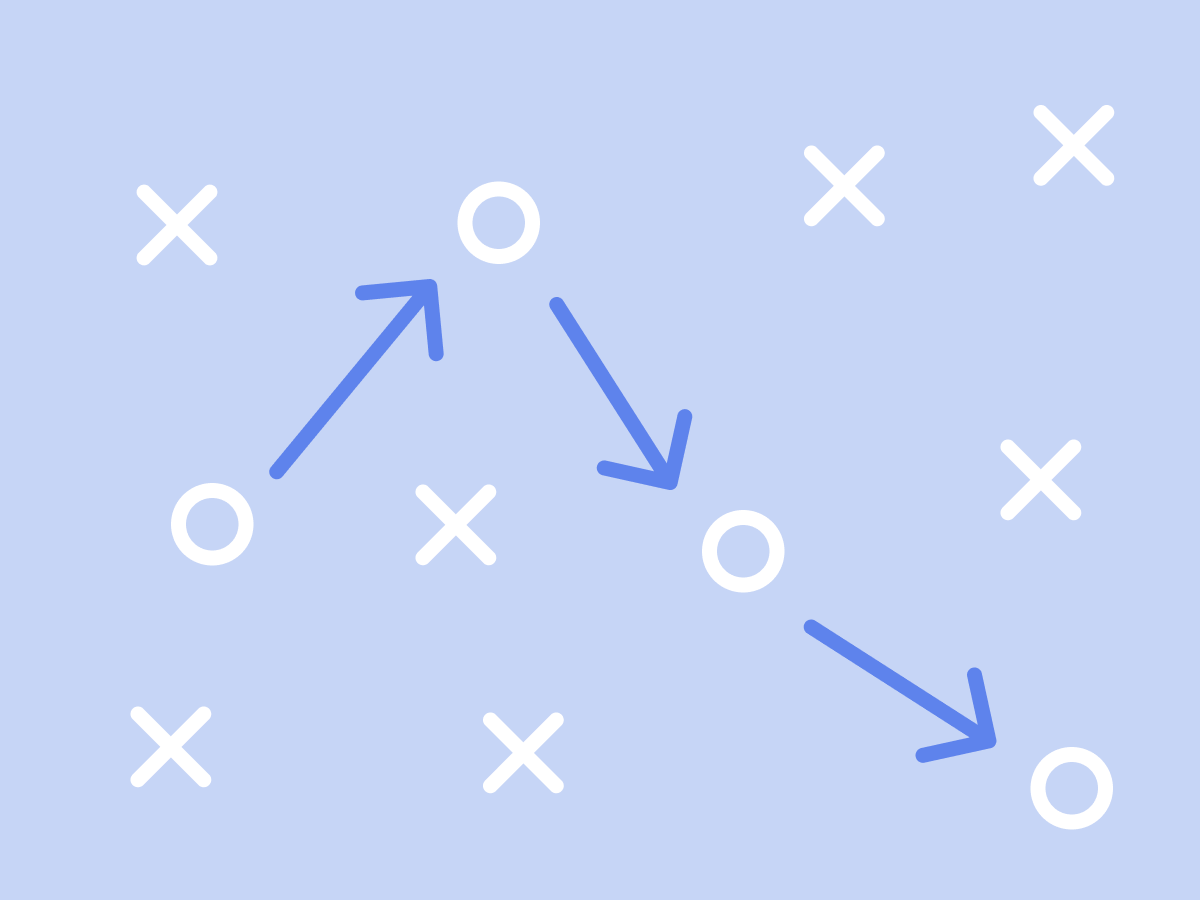
Uncleared product strategy
1. The strategic difference between websites and APPs are not cleared, so we spent a lot of time discovering the product positioning between the two platforms.
2. The client only has a general goal, but they are not clear what milestone they have to achieve.
-

Change the working habit
The sea freight industry has a long history and they already have a rooted way of working since several decades ago. It's not easy to convince them to migrate their daily work online.
Contribution
-
User interview and ideation
Host several user interviews to uncover insights and translate concepts into features.
-
Workshop facilitation
Facilitated several workshops with other designers to get the client's visions and understand their requirements.
-
Wireframe and prototypes
Created wireframes and prototypes to share the vision and design principles to align with clients before we handed them over to the UI team.
-
Define scope and priority
We defined the scope of the first release based on the business goal and the tech capacity, then, prioritized and negotiated features for launch and beyond with the client.
-
Validation
Prototype testing and assumption validating with the users after creating high-level prototypes, to ensure the solution really works.
Product evolution
-
Vision workshop
By interviewing their clients, suppliers, employee, and their senior management, to understand their expectations for the APP, their current business workflow, and the client‘s long-term business goal.
-
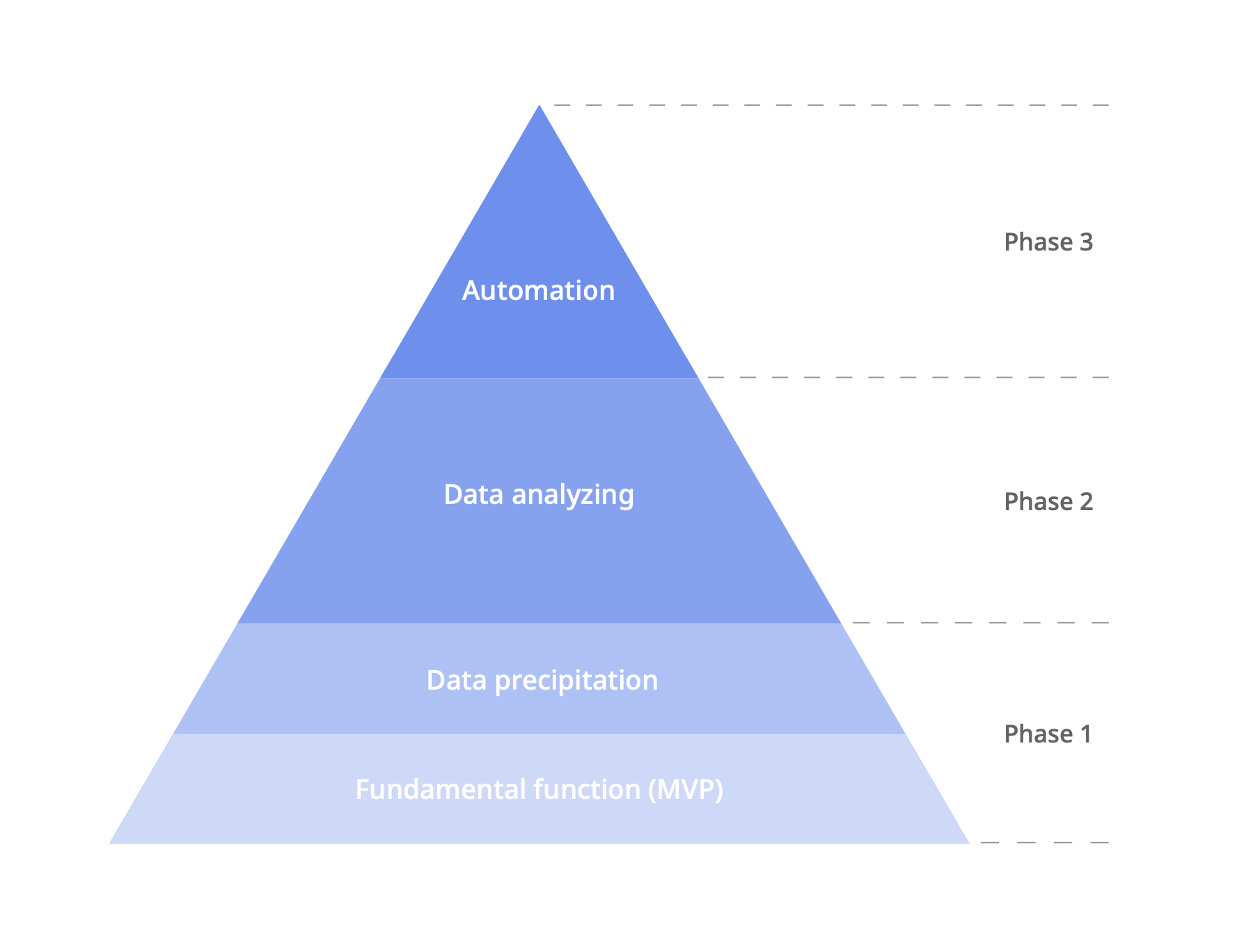
Periodical tasks
Based on the outcomes from the vision workshop, we made a high level plan and divided into 3 phases.
-
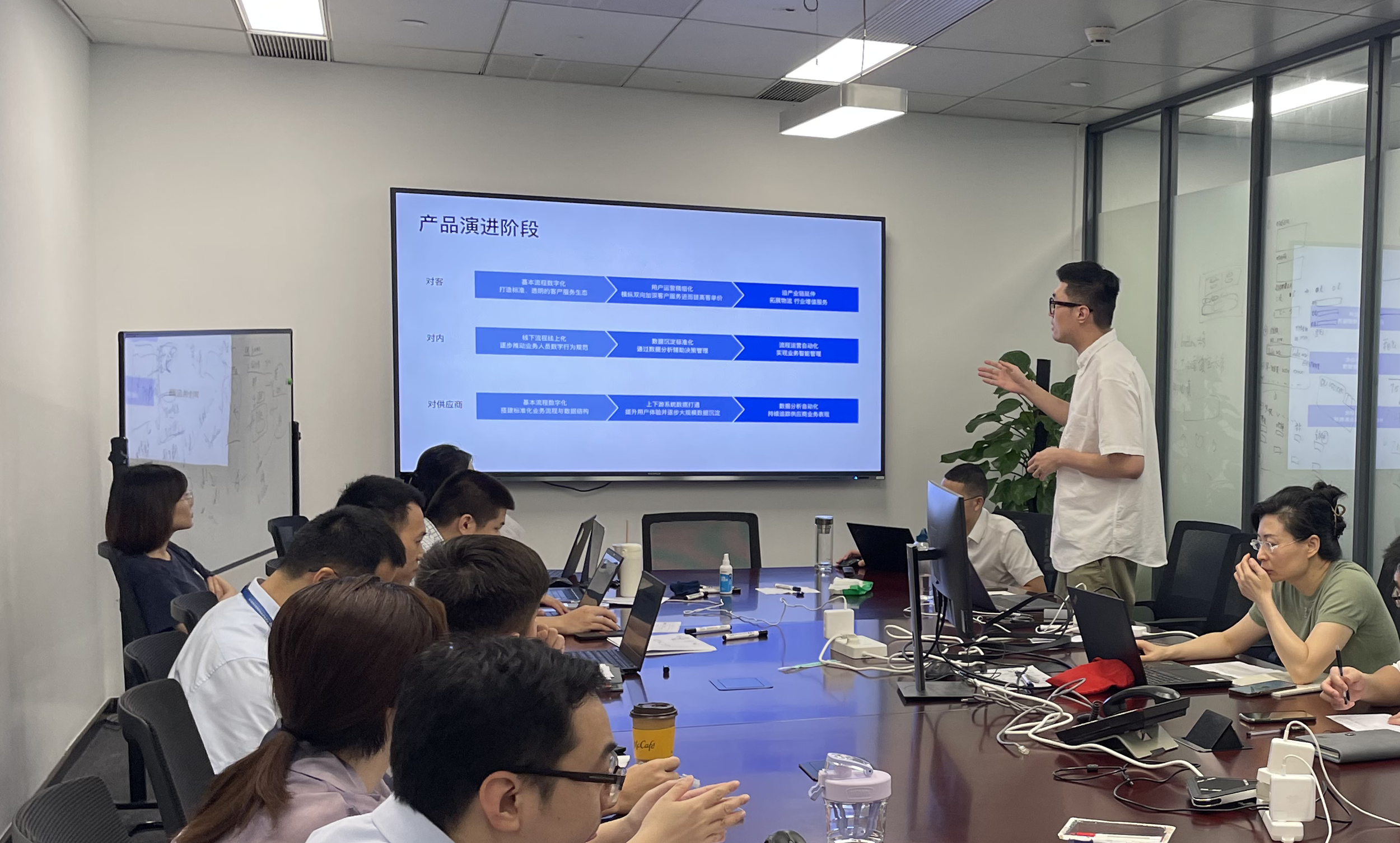
HMW workshop
After we came up with the strategy and align with the client, we hold the HMW workshop with the clients from different business units to understand what kind of features potentially could be planned and prioritized in order to reach the periodic goals for each product.
Strategy
-

Periodical tasks
Since the client is still in a very early stage of digital transformation, the primary thing for them now (phase 1) is collecting clean data as much as possible, in terms of business data, user profile, user behavior, feedback...etc. Another task for phase 1 is also MVP (minimum viable product) validation to verify if they really need the system across 2 platforms...
Once they have enough data, they can start to analyze them and make a detailed plan to reach the final goal, which is market expansion and operational automation.
-

Get existing client to use the product
One of the biggest concerns from COSCO is how to persuade their clients starting to migrate the offline process to online. Thus, we involved COSCO's existing client in the product design and research process, in order to show the value and deliver the message that the product is designed to solve your pain points.
COSCO can also prepare some training materials which emphasize the product value for COSCO's client manager to learn. In this case when the product release, they are able to promote and coach their clients. Furthermore, during the training session, the manager can also collect the client's feedback and fix the negative one in the next iteration.
After the pattern has been run for a few iterations and the product usage rate getting stable, they can expand the promotion to their potential or new clients. Once they got enough users, they can start to layer and set up different strategies for them, in order to keep them and make more profits.
-

Start small but move fast
Considering the limited time given and the tech capacity, although we identified 3 personas after the user research, we still decided to focus on only one first and put most of the effort and resources into it for the MVP.
The persona we select has a strong influence on the company's profit, so we map out all the pain points and filter them in 2 rounds. We picked up the small effort but big value one first, then identify the mobile friendly items to include in the MVP scope. We decided to provide a better customer experience to them first and get feedback to verify the solutions and enhance the product, in order to maximize our client's benefits.
Discovery
-
Interview with COSCO's client
We interviewed several users from different COSCO's clients. We divided them into 3 types based on the business interaction they are in charge with COSCO.
-
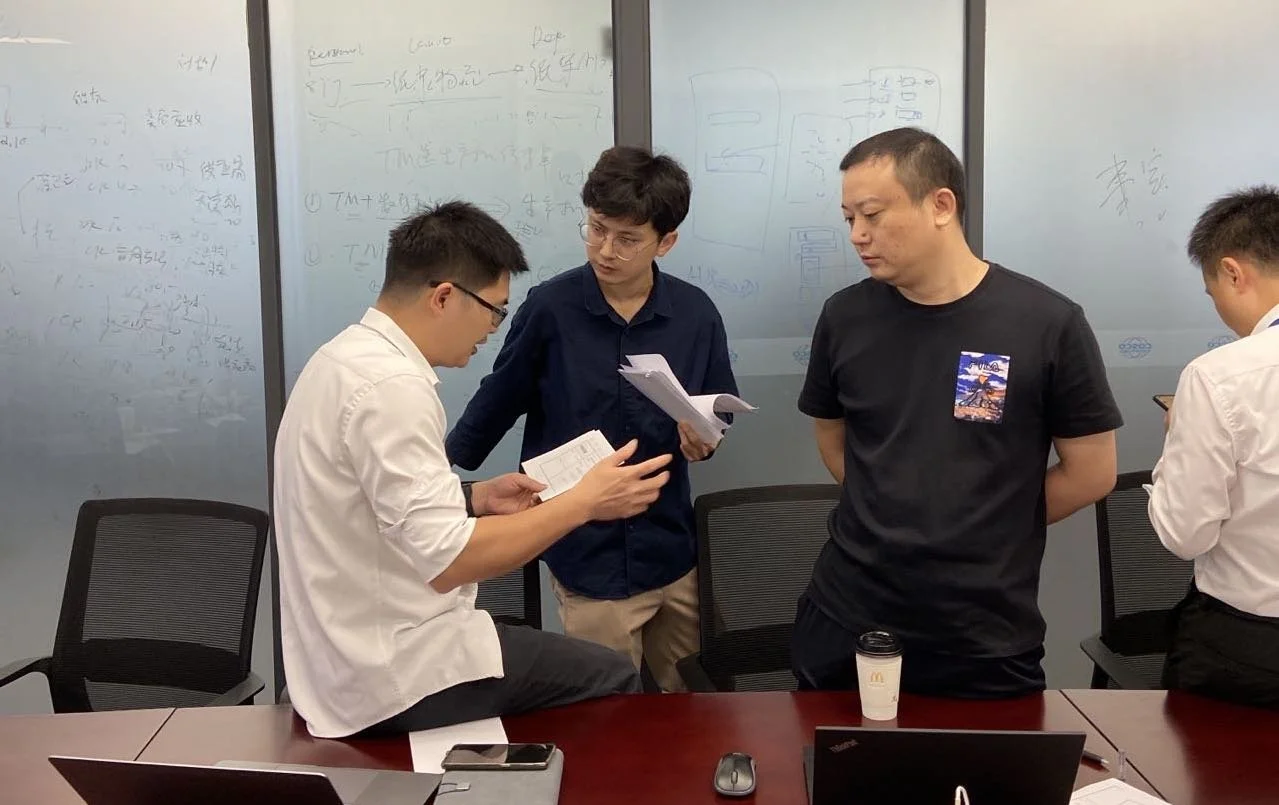
Observe and interview with COSCO
We worked in the COSCO office to observe how they deal with the daily work and interact with their client. After that, we prepared some questions and interview them on how they think about the current workflow, and what's their expectations and verify some assumptions.
-
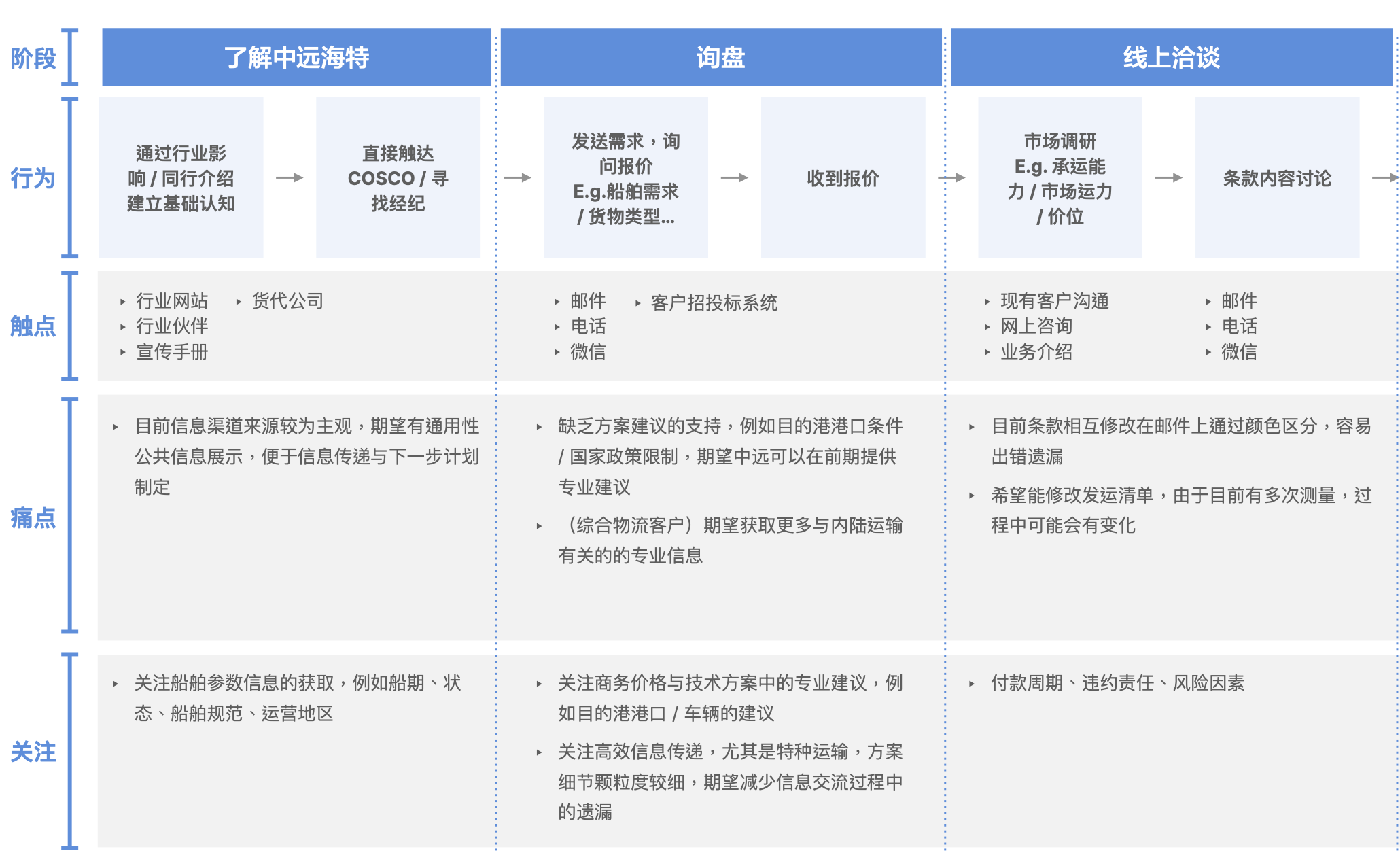
Analyze AS-IS user journey
We mapped out the user journey and check with COSCO and their clients during the interview to help us clarify the current business flow, then identify the current pain points.
Persona
Pre-sales follower
Yongqiang Wang (48)
He works in a pulp company as a senior business manager and the company has regular shipping demands from Brazil to China. 5 years ago his friend who also works in the same industry introduce COSCO SPEC to him and started to collaborate with them.
Behavior
Inquiry phase: The main way to obtain information is inquiring with COSCO by WeChat and email. Sometimes it may be during non-work hours.
Contract signing phase: Considering confidentiality of the contract , communication is mostly done in person or through formal emails.
Goal
Get the quotation as soon as possible, so that he has enough time to discuss it with the finance team and make the subsequent plan.
Make a good deal in the contract negotiation.
Ensure the process works smoothly before the shipment.
Frustrations
Currently there is no place to obtain detailed parameters of vessel type/price/specific rates on my own. I need to proactively request it from the sales.
When we have specific requirements, we expect to get helps and professional advices on decision-making quickly.
Expect a more efficient way to contact with COSCO.
Unable to obtain the approximate price range, making it hard to plan in advance.
Execution follower
Wei Chen (33)
She works in a pulp company as a logistics specialist. Due to COSCO's strong expertise and wide routes, it has formed long-term and stable cooperation. She is also exploring more potential cooperation with COSCO.
Behavior
As I'm responsible for managing multiple cases, I need to stay up-to-date on the latest status of each one. This sometimes requires me to work late hours.
If we want to know the transportation progress we need to ask COSCO via email, or check it on 3rd party tracking website.
I need to go to the port following up the loading frequently.
Goal
Closely monitor the shipping process to stay aware of any potential issues. This will allow for timely adjustments to the subsequent plan, in case any emergencies arise.
Ensure the cargo is loaded successfully.
Frustrations
Without real-time visibility into the shipping progress, we need to proactively reach out to COSCO via email and phone to inquire about any changes. However, their responses are often not in time.
Currently, there is no 24/7 customer support available to address emergencies or handle inquiries as they arise.
Expect to inform in advance when the shipment may have changes.
Post-sales follower
Felipe Branco (43)
He works in a pulp company as a logistics manager. The company he work is Cosco's long-term partners in Brazil, they have many expectations for enhancing international cooperations.
Behavior
Due to the time difference, I need to communicate with COSCO after work sometimes.
The distance between the port and the factory is long which requires frequent travel.
Monitoring the price changes of fuel and shipment fee, then check upon while receiving the invoices.
Upload your own company's financial system after checking the information on the invoice
Goal
Closely monitor the shipping process to stay aware of any potential issues. This will allow for timely adjustments to the subsequent plan, in case any emergencies arise.
Ensure the cargo is unloaded successfully.
Expedite the settlement process.
Frustrations
Without real-time visibility into the shipping progress, we need to proactively reach out to COSCO via email and phone to inquire about any changes. However, their responses are often not in time.
Now information without security concerns still needs to request COSCO, which is very inefficient.
Expect to inform in advance when the shipment may be delayed.
Expect to expedite the settlement process.
Insight
From client
-
Some clients are still not familiar with COSCO SPEC's services and ability, when they go to the system on PC there is no place for them to check.
-
During the entire process, the contract neogtiation takes the longest time because currently all the communication are still via email and phone call and normally it will send back and forth several times.
-
During the contract negotiation process, the client is relatively passive, their inputs are based on the first version provided by the COSCO side. Sometimes they already have some idea but still need to wait.
-
It's a global business so they need to communicate across several time zones, it's quite hard to contact in time if they have questions, especially when an emergency comes up.
-
Currently, all the info is hidden in the email thread, when they draft a new version, they will refer to the previous one. Now they will dig out and export the email, then open them in 2 windows to compare.
From COSCO SPEC
-
Negotiation via email is easy to lose track, especially for a business representative from COSCO side who has to serve several clients, sometimes it even delays the contract starting date.
-
Especially during the inquiry phase, if the client waits too long they might change their mind to find a new charterer.
-
Each client communicates with the business representative via different channels, because every country has its preferred chatting tool, which means they have to install all of them on their own phone.
-
Most of the contract info are quite similar, every time they provided a new contract to the client, they just need to change some key information.
-
Every time when the client comments on the contract, COSCO need to provide a new version to them and it takes a lot of time.
-
The data is everywhere (email, chatting tool, system ...), and it's a nightmare when the person in charge leaves the company, and also a challenge if they want to move on to the next level of data analyzing.
Approach
-

Proposal from both side
One party can draw up a draft contract first and then send it to the other, if the receiver agrees, then it can move on to the next step; if not, the receiver can provide a new proposal until both parties make an agreement.
-

Detailed history
The sea freight contract is comprised of several terms and agreements. Displaying the editing history for each of them in one place is easier to refer and track.
Solution
-
Online co-editing
Their client can also provide their ideal proposal and it also reduces the workload of subsequent contract amendment from the COSCO side.
-
Negotiation history
Collect all the version histories in one place under each term, it's easier for both sides to refer to. When it comes to commercial disputes, it's also the single source of truth.
-
Standardized contract editing
In order to speed up the process, we transform the traditional contract editing way into a standardized form, users just need to select and fill in some key information in the fields.
-
General info and FAQ
In order to mitigate the delayed response caused by the time difference, the system provides more general info and FAQ /chatbot for users to view when they have questions.
-
Chatting room and notification
Ensure the client can communicate with the COSCO side in time and get notified of the urgent information.
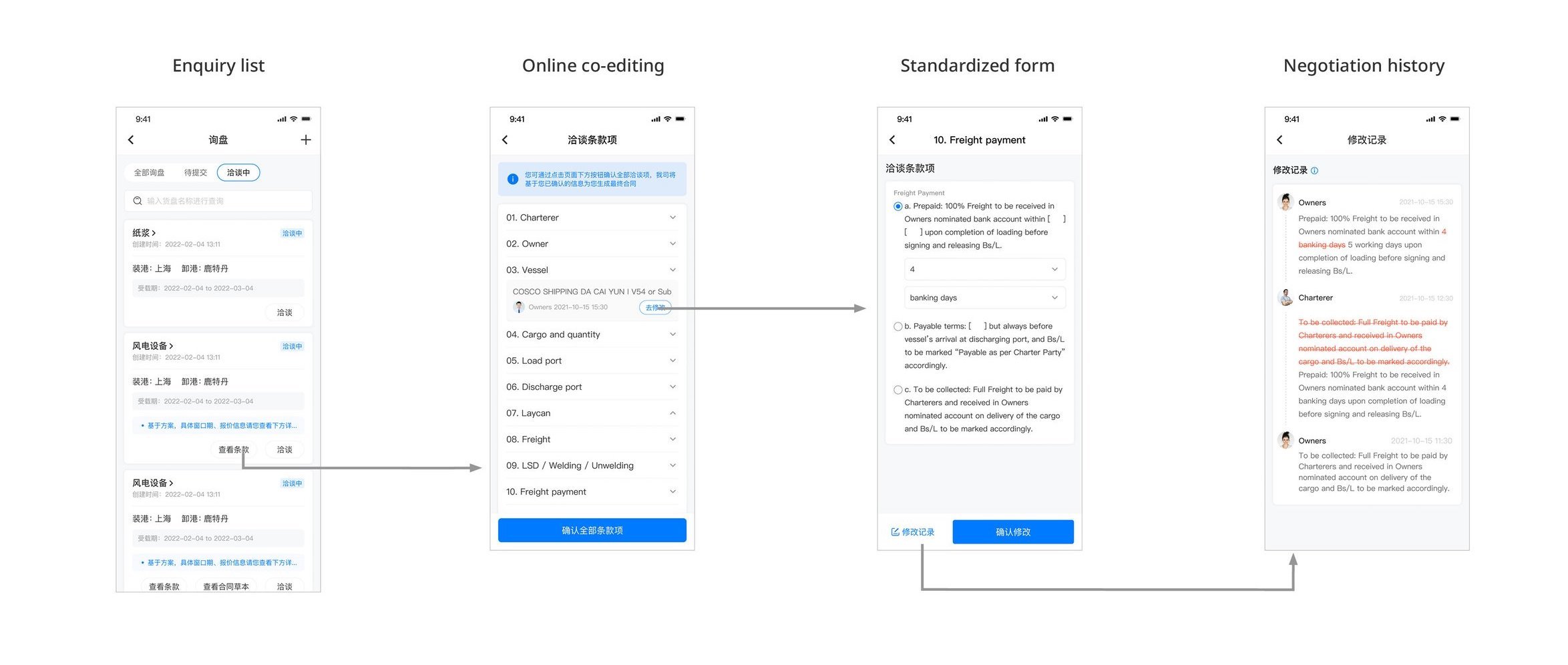
Prototype testing
In order to verify if the product can really help the user and ensure the user experience is rational, we made a clickable prototype for users to operate on their mobile phones and then collect their feedback to enhance the design.
